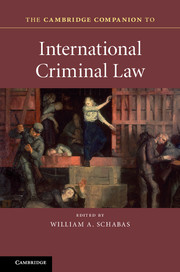Book contents
- Frontmatter
- Dedication
- Contents
- List of contributors
- List of abbreviations
- Introduction
- PART I PURPOSES AND PRINCIPLES
- 1 Human rights and international criminal law
- 2 Truth and justice in atrocity trials
- 3 Transitional justice
- 4 Punishment and sentencing
- 5 Peace
- PART II INSTITUTIONS
- PART III CRIMES
- PART IV TRIALS
- PART V THE FUTURE
- Index
- References
5 - Peace
from PART I - PURPOSES AND PRINCIPLES
Published online by Cambridge University Press: 05 December 2015
- Frontmatter
- Dedication
- Contents
- List of contributors
- List of abbreviations
- Introduction
- PART I PURPOSES AND PRINCIPLES
- 1 Human rights and international criminal law
- 2 Truth and justice in atrocity trials
- 3 Transitional justice
- 4 Punishment and sentencing
- 5 Peace
- PART II INSTITUTIONS
- PART III CRIMES
- PART IV TRIALS
- PART V THE FUTURE
- Index
- References
Summary
Peace is not an eschatological phenomenon, but a continuous work-in-progress. It encompasses multiple legal commitments undertaken by all member States of the United Nations pursuant to the UN Charter and numerous regional and universal treaties on issues such as collective security, disarmament, and international criminal law. Moreover, it is de lege ferenda a soon to be codified human right with both individual and collective dimensions. In 2012, the Advisory Committee of the Human Rights Council elaborated a Draft Declaration on the Right to Peace, with a view to reaching a consensus text for adoption and referral to the General Assembly for proclamation. However, it has proven difficult to bring some of the major powers on board. They remain reluctant to accept the limitations of article 2 paragraphs 3 and 4 of the Charter of the United Nations, which, however, constitute a jus cogens obligation of all States members of the United Nations, a veritable jus contra bellum. It is sad to observe how States persist in claiming that there is no legal basis for a human right to peace, and that the Human Rights Council is not the proper venue to discuss this fundamental right.
There is no generally accepted legal definition of peace. Obviously the concept is incompatible with historical precedents of the destruction of the enemy, as Rome perpetrated on the Carthaginians 146 BCE at the end of the third Punic War (Carthago delenda est, Cato the elder). Nor is peace the silence of cemeteries described by Tacitus in Agricola, that prerogative of the stronger to devastate the weaker and then to make a desert of its homeland (ubi solitudinem faciunt, pacem appellant). Peace is a state of harmonious national and international relations based on the rule of law, justice, and solidarity, consistent with the motto of the International Labour Office: ‘if we want peace, we must cultivate social justice’ (si vis pacem, cole justitiam).
Besides its philosophical, sociological, and religious components, peace encompasses important legal commitments. As emphasised by the United Nations Security Council, the rule of law is a vital element of conflict prevention and peacekeeping. The breach of the peace by aggression constitutes an internationally wrongful act giving rise to State responsibility, the obligation to make reparation, and personal criminal liability.
- Type
- Chapter
- Information
- The Cambridge Companion to International Criminal Law , pp. 97 - 114Publisher: Cambridge University PressPrint publication year: 2016
References
- 1
- Cited by

